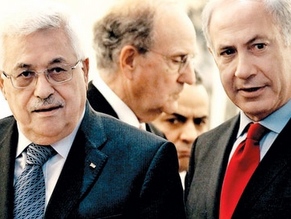|
World Jewish News

Mahmoud Abbas and Benjamin Netanyahu in Jerusalem. Photo by: AP
|
Netanyahu: Abbas is distorting known historical facts
17.05.2011, Israel Prime Minister Benjamin Netanyahu accused Palestinian President Mahmoud Abbas of "blatantly distorting known historical facts" in an op-ed Abbas published in the New York Times earlier Tuesday.
Netanyahu refuted the article's claim that Israeli forces expelled the Palestinians from their land during the War of Independence in 1948, saying "It was the Arab armies, with Palestinian help, who attacked the Jewish state in order to destroy it." He added that "There is no mention of this in the article."
He emphasized the Palestinians' rejection of the UN's partition plan in 1947, while the Jews were willing to accept it.
Netanyahu also stated that the article misleadingly presents the Palestinian refugee issue as one of the causes that led to the outbreak of war in 1948.
"The Palestinian refugees were an outcome of that war, not a cause," the prime minister said. "Some Palestinian leaders themselves urged the Palestinians to vacate the land in order to make it easier for the Arab armies to fight for the destruction of Israel," he added.
The written statement issued by the Prime Minister's office on Tuesday further said that the "The Palestinian leadership saw the establishment of a Palestinian state as a way to continue the conflict with Israel, rather than end it."
"Abbas has chosen a strategy to establish a Palestinian state and used this improved position to wage a diplomatic and legal war against Israel," a senior Israeli government official, who declined to be named, also said.
Netanyahu's upcoming high-profile visit to Washington, where he will also address a joint meeting of the U.S. Congress on May 24, is widely seen as part of an Israeli diplomatic drive to persuade major international players to oppose the Palestinian bid.
Setting the stage for his U.S. trip, Prime Minister Benjamin Netanyahu told Israel's parliament on Monday that a Palestinian government that includes Hamas, whose founding charter calls for the Israel's destruction, could not be a partner for peace.
However, drawing criticism from settler leaders and right-wing politicians, Netanyahu held out the prospect of handing over parts of the West Bank if the Palestinians accepted his peace terms, saying a deal would encompass "tracts of our homeland".
Those conditions, which include Palestinian recognition of Israel as the homeland of the Jewish people and acceptance of a long-term Israeli military presence along the eastern border of their future state, have been rejected by Abbas.
In Abbas' article, which appeared in the New York Times three days before U.S. President Barack Obama is due to host Netanyahu at the White House, Abbas urged the international community to recognize a Palestinian state at the United Nations in September and support its admission to the world body. He said that U.S. political pressure had failed to stop Israel's settlement program in the occupied West Bank, and Palestinians "cannot wait indefinitely" for a state of their own.
So far, the United States has been cool to the idea of UN recognition and has urged the Palestinians and Israel not to take unilateral steps that could jeopardise a final peace settlement.
Haaretz.com
|
|
